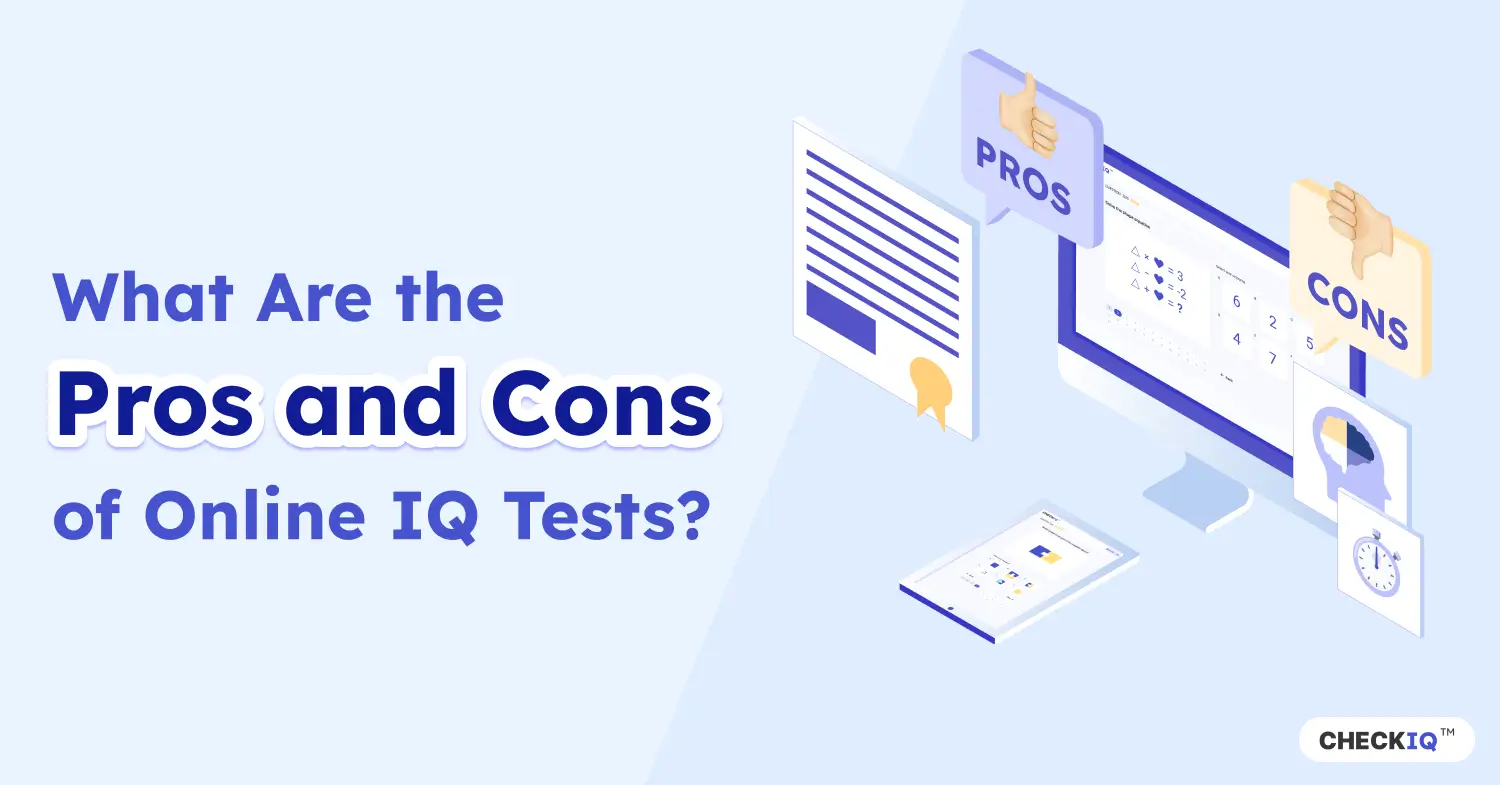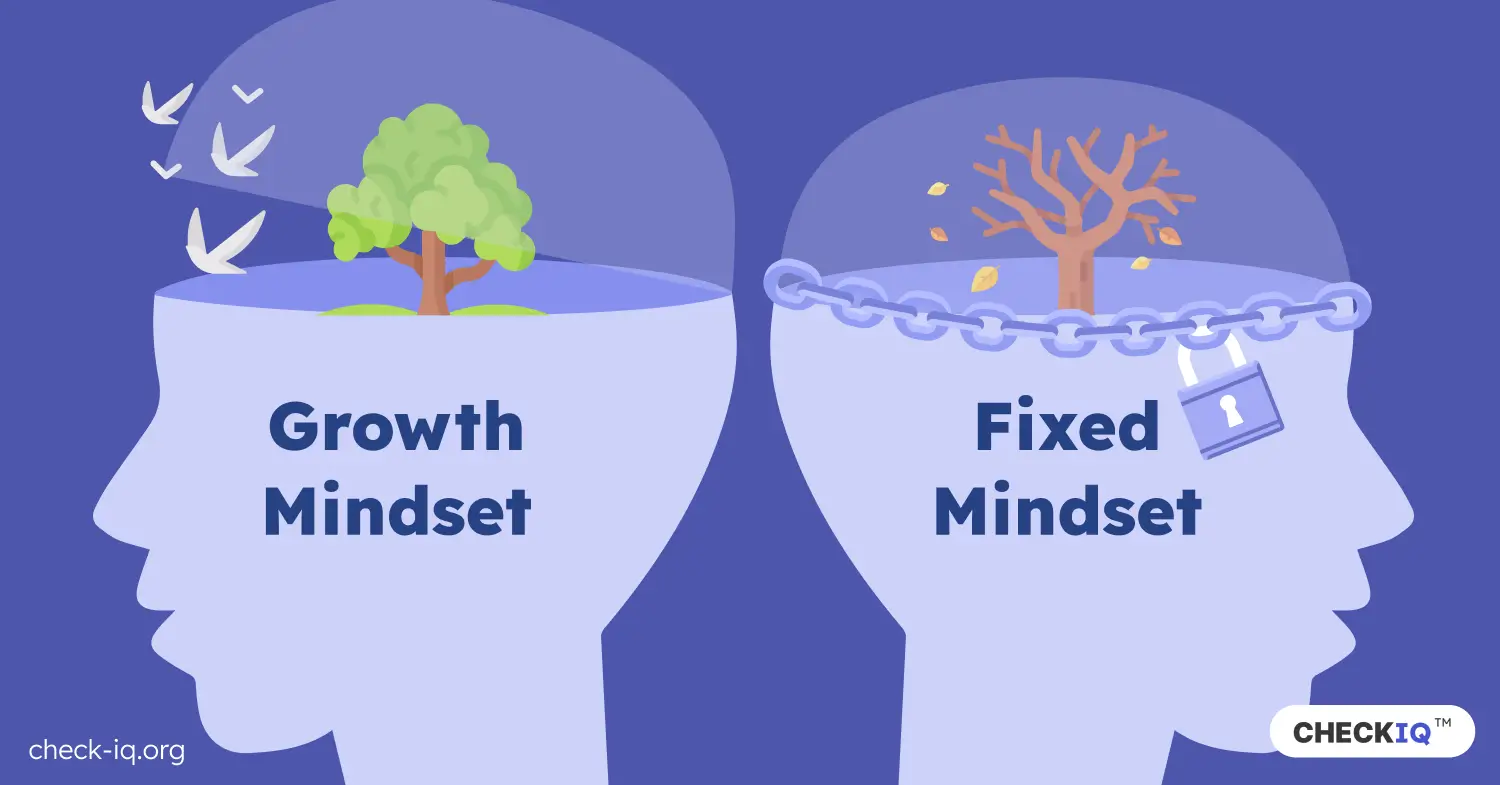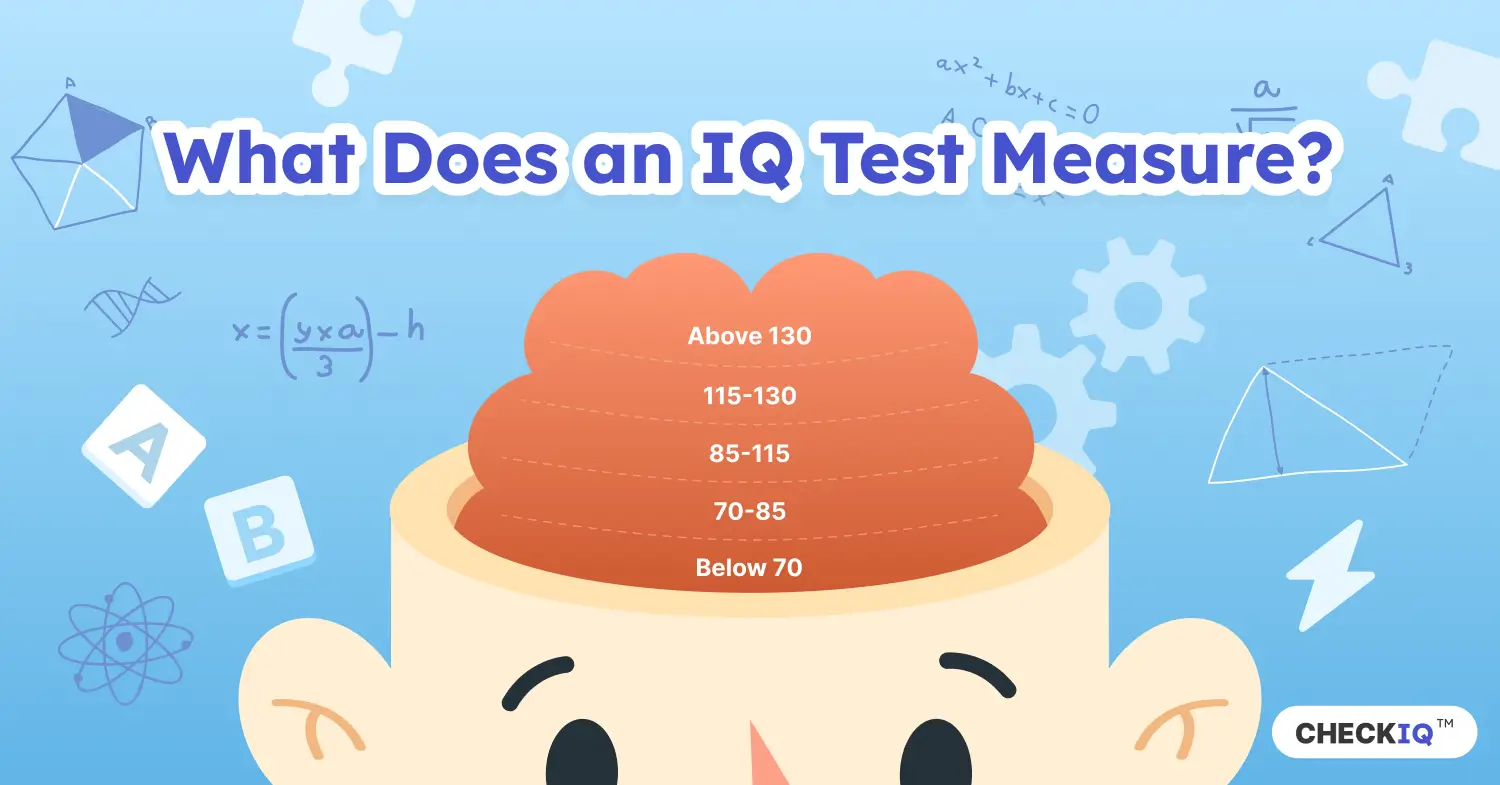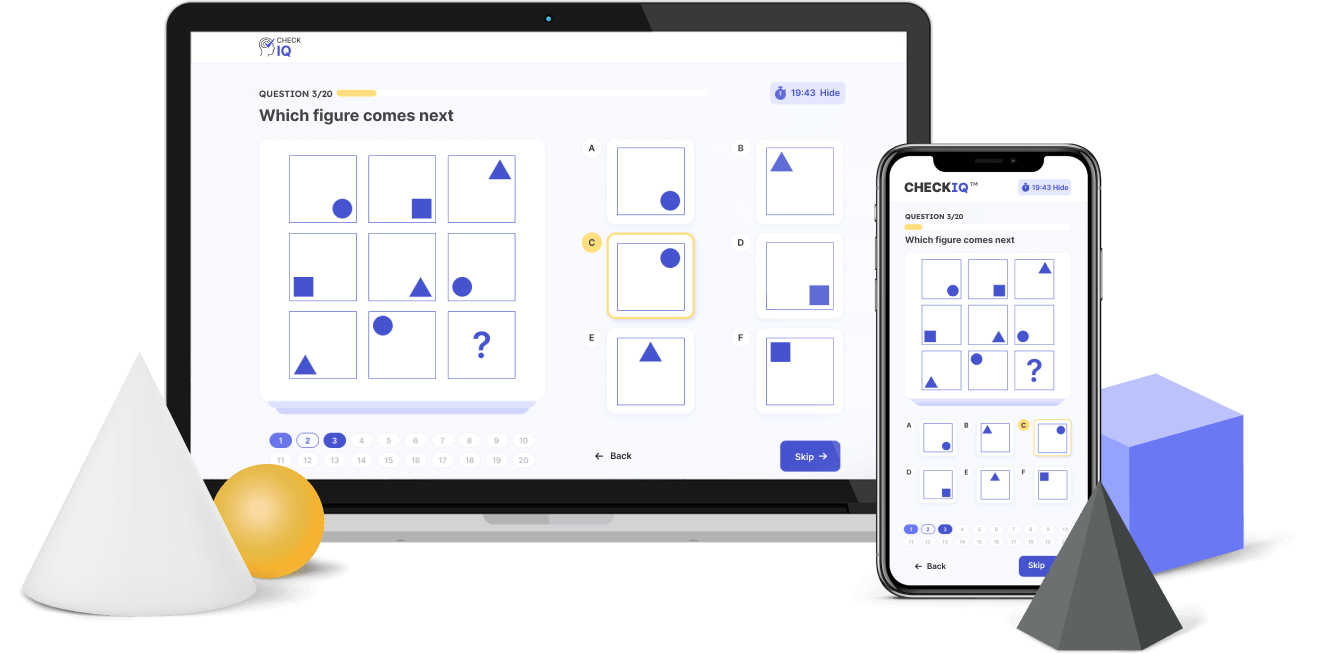There are so many online tests and quizzes these days; from those titled ‘Take this quiz to know what Sitcom Character you are’, to others that say ‘Find out Your IQ Score By Playing this Game’.
Of course, not every online test is legitimate. However, with the proliferation of online platforms, IQ tests have transitioned from being exclusive to psychological clinics and educational institutions to becoming widely accessible online. You can now assess your level of intelligence from the comfort of your home.
This shift has made intelligence testing more convenient and widespread, but it also raises questions about the reliability and implications of these tests. The transition from traditional intelligence tests to online tests has brought numerous pros and cons that echo throughout the fields of education and psychological assessment. Read on to find out more.
What Are IQ Tests?
An IQ test, or Intelligence Quotient test, is designed to measure different parts of your intelligence – things like problem-solving, reasoning, and memory. Think of it as a way to get an overall picture of how your brain processes and handles information.
Here are a few areas that IQ tests typically focus on:
- Problem-solving: How well can you figure things out?
- Numbers and logic: Can you work with numbers and spot patterns?
- Language skills: How good are you at understanding and using words?
- Spatial skills: How well do you visualize and work with shapes or spaces?
- Memory: How good are you at remembering things?
IQ tests have been around for over 100 years. They were originally created to help identify kids who needed extra support in school. Over time, they’ve been used for other things too, like career assessments or research.
A reliable 100% adaptive online IQ Test. Get your IQ score immediately.
Start My IQ Test
How About Online IQ Tests?
Online IQ tests have made intelligence testing accessible to everyone. They’re easy to find, quick to take, and often provide instant results. However, they’re not the same as professional tests. While some online tests fairly accurate and well-designed, many are just for fun and lack the accuracy or depth of official assessments.
Pros of Online IQ Tests
Here are some unique benefits to consider when it comes to online IQ tests.
Convenience
You can take online IQ tests from the comfort of your home at any time that suits you. This eliminates the need for scheduling and traveling to a testing center.
Time efficiency
Online IQ tests typically take less time to complete than traditional tests administered by psychologists, allowing for quicker assessments.
Self-paced
You can complete online IQ tests at your own pace without feeling rushed by an examiner, which can lead to a more comfortable testing experience. This could also lead to better test results.
Cost efficient
While serious online IQ tests aren't free, they cost much less than physical professional assessments. A psychologist-administered IQ test in the U.S. can cost at least $500, whereas most online tests are much cheaper.
Immediate results
Online IQ tests often provide instant feedback, allowing you to see your results and insights right after completing the test.
Broader access
These IQ tests are available from anywhere in the world. People in remote or underserved areas who might not have access to a licensed psychologist can still assess their cognitive abilities through online tests.
Reduced bias
Online tests can minimize potential biases from human examiners. Since the interaction is purely digital, it removes any inadvertent cues or influences that a psychologist might unintentionally provide.
Learning opportunities
Immediate results from online tests allow for quick learning and adjustment. If used as a learning tool, individuals can quickly identify areas of improvement and work on them, unlike traditional methods where results might take longer to receive and review.
Flexibility
Many online IQ tests offer flexibility in terms of pacing. You can take breaks as needed, which can be particularly beneficial for individuals who may need more time.
Anonymity
Taking an online IQ test can be done anonymously, which can reduce the anxiety or pressure some people might feel during in-person testing. At least, this allows you to avoid having to face someone to discover the results.
Variety of tests
There is a wide variety of online IQ tests available, allowing you to choose one that best fits your needs, whether you are looking for a general intelligence test or one that focuses on specific cognitive abilities.
Practice opportunities
Online IQ tests can serve as practice tools for those preparing for more formal assessments. Repeated practice can help improve test-taking skills and familiarity with the types of questions asked.
Potential for large-scale data collection
Researchers can gather vast amounts of data from diverse populations quickly, enabling large-scale studies that can contribute to the understanding of human intelligence across different cultures and demographics.
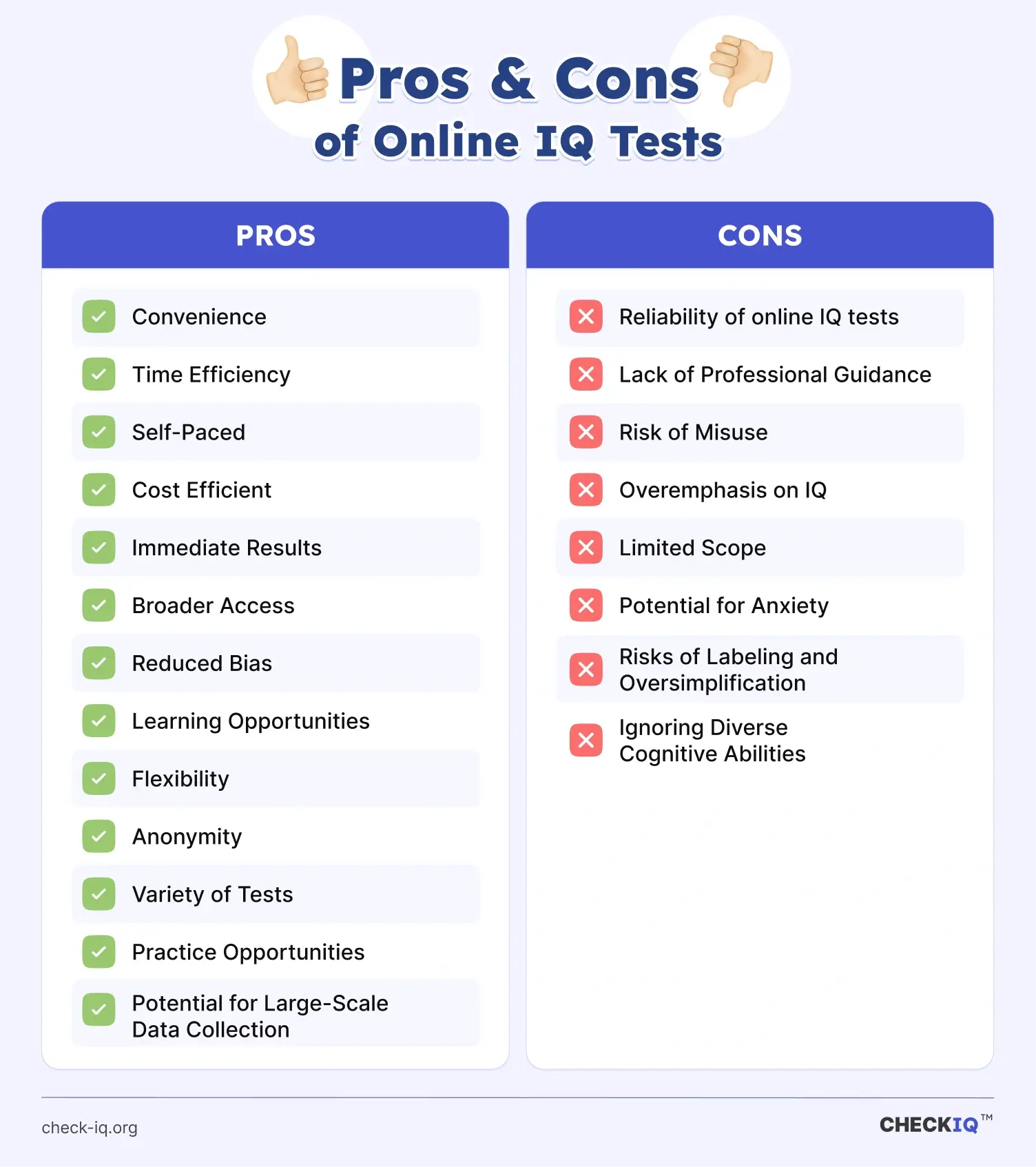
Cons of Online IQ Tests
Here are some of the major demerits of online IQ tests.
Reliability of online IQ tests
Many online IQ tests are not standardized, leading to huge variations in quality and results. This lack of standardization can result in misguided conclusions and decisions. Studies by American researchers have shed light on the nuances of interpreting IQ scores from typical standardized IQ tests. Professional types of IQ tests, like the Wechsler Adult Intelligence Scale (WAIS) and the Stanford-Binet Intelligence Scales for adults, or the Wechsler Intelligence Scale for Children (WISC-V) and Kaufman Assessment Battery for Children (KABC) for children, are carefully designed and validated, offering more reliable results. Also, despite their online availability, not everyone has reliable internet access or digital literacy, which can exclude certain populations from participating.
Risks of labeling and oversimplification
Misinterpreting results can lead to oversimplification and unfair labeling. For example, children labeled with high or low IQs based on potentially unreliable online tests might be pigeonholed into roles that don't reflect their true abilities or potential for growth in various areas beyond conventional intelligence metrics.
Ignoring diverse cognitive abilities
Online tests often measure a narrow range of cognitive abilities, ignoring broader concepts like emotional intelligence or creativity. People with learning differences or those who may not perform well in timed tests can be unfairly judged by the rigid standards of many online IQ tests.
Lack of professional guidance
Online IQ tests lack the benefit of on-site professional interpretation. Psychologists provide insights, context, and guidance that online platforms can't match. A professional can help understand nuances and implications of the results.
Risk of misuse
Without proper context, online IQ test results can be misused. For example, employers or educators might make decisions based on incomplete or inaccurate test results , potentially harming individuals' opportunities.
Overemphasis on IQ
Focusing solely on IQ scores can neglect other important attributes like emotional intelligence, social skills, and creativity. A holistic approach to assessing cognitive and personal strengths is crucial for a complete understanding.
Limited scope
Online IQ tests may not cover all aspects of intelligence, such as practical problem-solving skills or adaptive behaviors, which are often evaluated in professional assessments.
Potential for anxiety
Taking an online IQ test without professional support can cause anxiety or stress, especially if the results are not as expected. A professional can help mitigate these feelings and provide constructive feedback.
Are Online IQ Tests Reliable?
The answer to this can be quite variable. Online IQ tests are ubiquitous but as we’ve mentioned earlier, their reliability varies widely. This is mainly due to the following concerns.
One such concern is the environment in which the test is taken. Unlike controlled testing environments for traditional tests, online tests can be taken in varied settings, affecting concentration and performance.
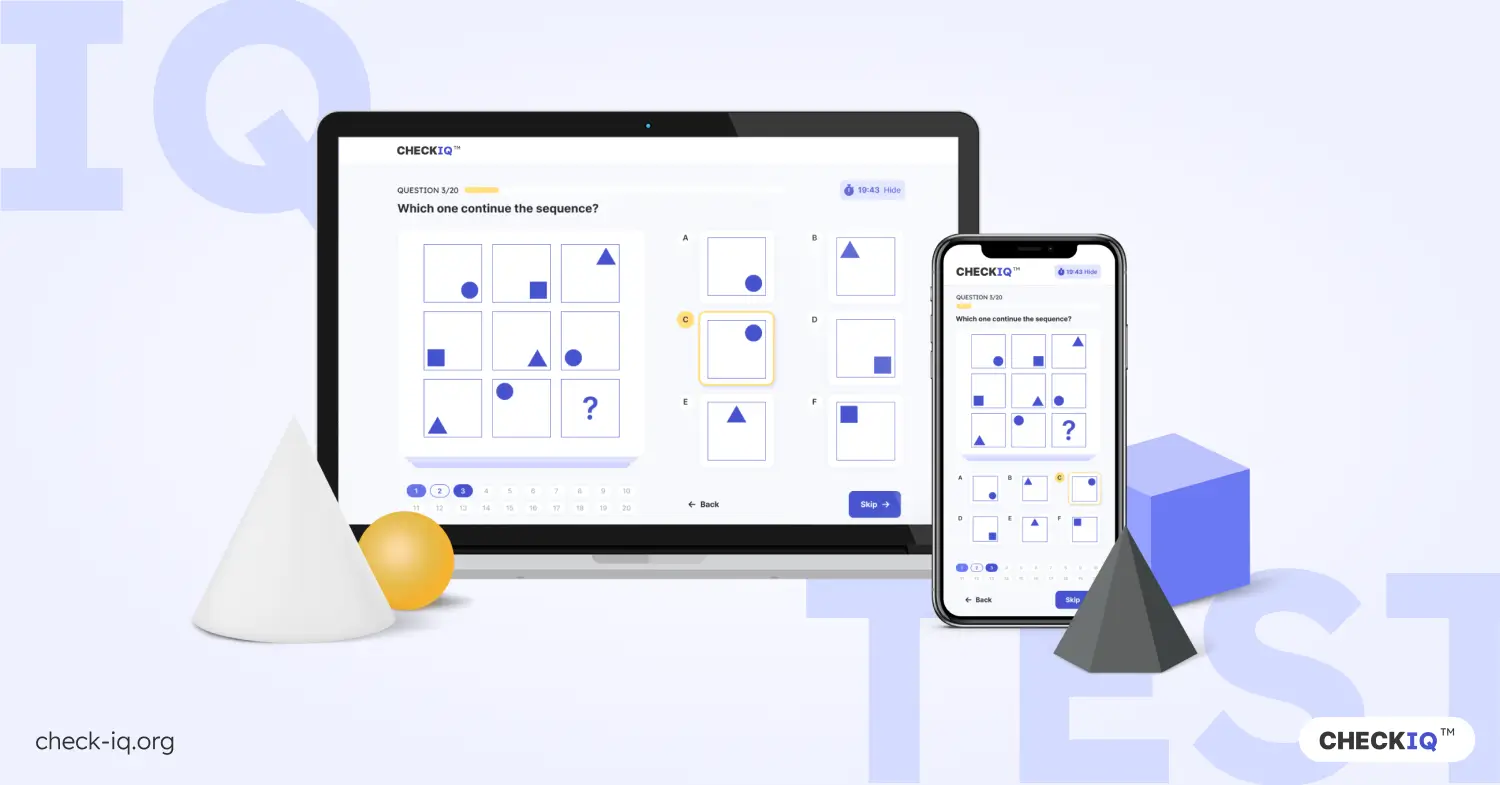
Moreover, the content of many online IQ tests may not be comprehensive enough to measure all aspects of intelligence. They may be emphasizing certain cognitive skills like quantitative reasoning at the expense of others, such as spatial orientation.
Another factor to consider is that you can study for an IQ test. If it’s a fixed IQ test with the same questions, you may artificially inflate your IQ score through repeated practice. However, an adaptive IQ test, which presents new questions based on your previous answers, is less susceptible to this kind of inflation and can provide a more accurate measure of your true cognitive abilities.
The heterogeneity in test formats can also contribute to varying results; a person may perform differently on one type of test compared to another. A study suggests that diverse question formats in tests may influence the fairness and accuracy of assessment for people with different IQ levels.
How to Choose The Right IQ Test
With a ton of online tests proclaiming to measure intelligence, it's critical to choose the one that best aligns with what you're seeking to understand about your cognitive ability.
Here are a list of 10 tips to select the right online IQ test:
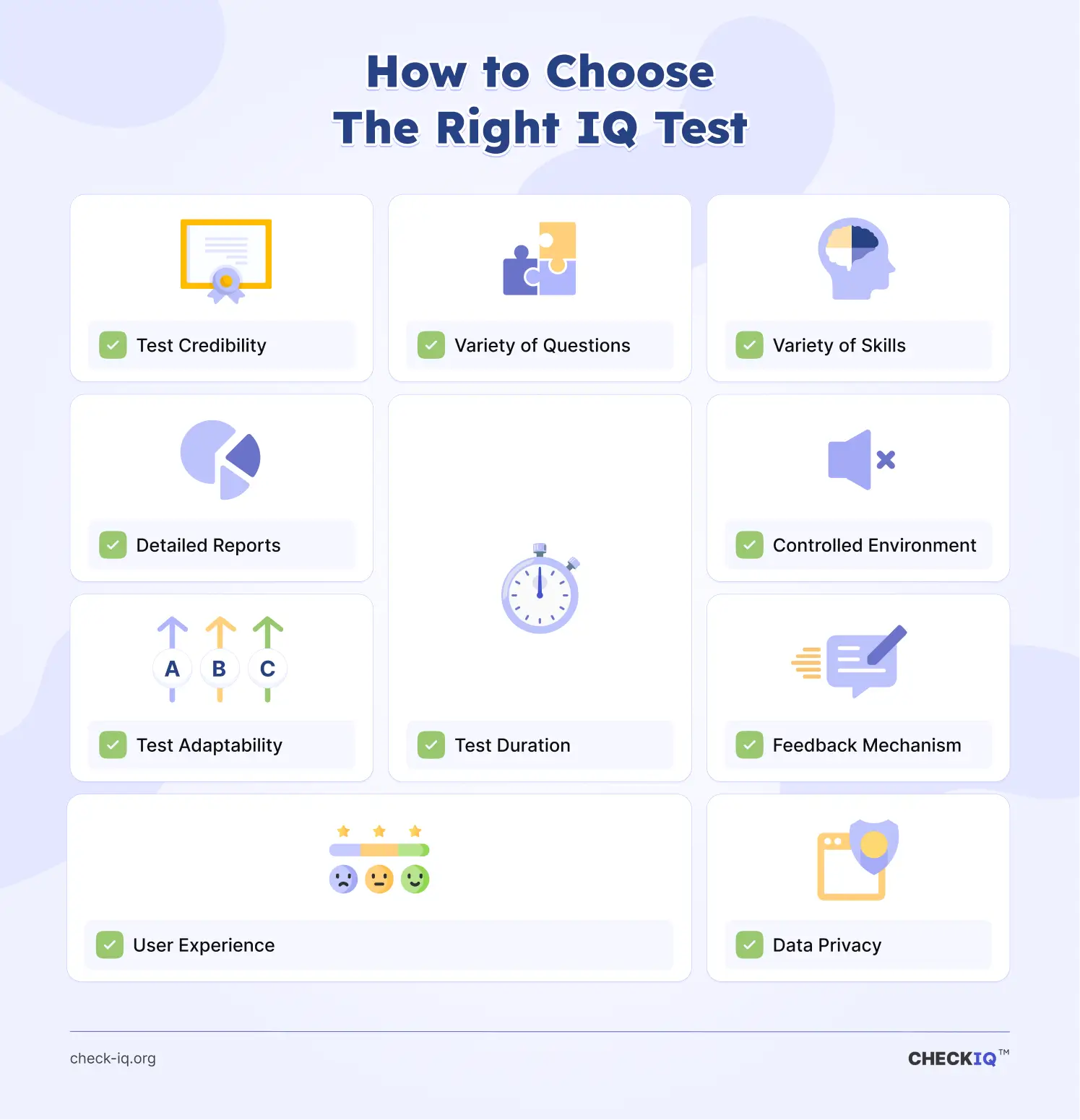
- Credibility: is the test designed by reputable sources and scientifically validated?
Prioritize tests created by qualified psychologists or reputable organizations. Look for evidence of validation studies, scientific research, or expert endorsements backing the test to ensure its reliability.
- Variety of questions: does the test offer a diverse range of questions?
Look for tests that assess different aspects of intelligence through various question types. A variety of question formats, such as multiple-choice, pattern recognition, and logical puzzles, provide a comprehensive understanding of your cognitive abilities. Avoid tests with fewer than 20 questions, as they may not be thorough enough.
- Variety of skills: does the test measure multiple cognitive skills?
Seek out tests that evaluate a broad range of skills, including quantitative reasoning, verbal ability, and spatial orientation. Assessing multiple cognitive domains offers a more accurate picture of your strengths and weaknesses.
- Detailed reports: does the test provide detailed reports of your results?
Choose tests that offer in-depth feedback, explaining your performance across various cognitive domains. Detailed reports help you understand your strengths and areas for improvement, offering actionable insights.
- Adaptability: does the test adjust the difficulty based on your responses?
Adaptive IQ testing adjusts questions according to your previous answers, providing a more personalized and accurate measure of intelligence. Look for an adaptive IQ test such as CheckIQ™ to ensure an efficient and precise assessment.
- Controlled environment: can the test be taken in a quiet, distraction-free setting?
Ensure the test includes guidelines for a consistent testing environment. A controlled setting helps maintain concentration and performance, leading to more reliable results.
- User experience: is the test interface user-friendly and accessible?
Opt for tests with a clear, intuitive interface and accessible instructions. A good user experience ensures you can focus on the test without technical distractions.
- Feedback mechanism: does the test avoid providing immediate feedback on your responses?
Select tests that do not give immediate feedback on whether you answered correctly or incorrectly. Immediate feedback can discourage you and affect your performance on subsequent questions. A well-designed test will provide results only at the end.
- Test length: is the test duration reasonable?
Choose tests that are long enough to be comprehensive but not so long that they cause fatigue. A well-balanced test duration ensures accurate results without overwhelming the test-taker.
- Data privacy: does the test ensure the confidentiality and security of your personal data?
Look for tests that guarantee the privacy and security of your information. Having clear terms and conditions regarding data use are essential to protect your personal information.
When You Need a Professional To Check Your IQ
While online IQ tests can provide a first assessment of your cognitive abilities, there comes a point where they may not be enough. Professional assessment is the next logical step.
You will need to meet a psychologist for a formal IQ assessment if:
- The results of an online IQ test have led to more questions than answers
- Your learning or psychological needs are complex
- The stakes of an accurate intelligence assessment are high, particularly when it's a matter of educational paths for children or career-related assessments for adults
Professional psychologists are equipped to administer comprehensive intelligence tests that consider factors online tests cannot – like environmental influences, nuanced problem-solving abilities, and emotional intelligence.
Moreover, these in-person assessments provide bespoke insight that online tests, designed for the masses, cannot. In the end, it all depends on what works for you.

